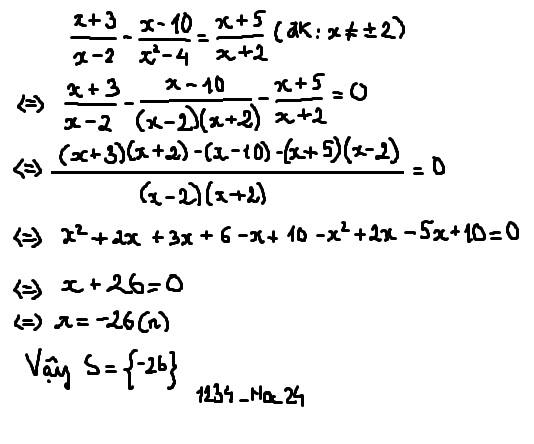

Hãy nhập câu hỏi của bạn vào đây, nếu là tài khoản VIP, bạn sẽ được ưu tiên trả lời.



Câu 1 :
a, \(\frac{3\left(2x+1\right)}{4}-\frac{5x+3}{6}=\frac{2x-1}{3}-\frac{3-x}{4}\)
\(\Leftrightarrow\frac{6x+3}{4}+\frac{3-x}{4}=\frac{2x-1}{3}+\frac{5x+3}{6}\)
\(\Leftrightarrow\frac{5x+6}{4}=\frac{9x+1}{6}\Leftrightarrow\frac{30x+36}{24}=\frac{36x+4}{24}\)
Khử mẫu : \(30x+36=36x+4\Leftrightarrow-6x=-32\Leftrightarrow x=\frac{32}{6}=\frac{16}{3}\)
tương tự
\(\frac{19}{4}-\frac{2\left(3x-5\right)}{5}=\frac{3-2x}{10}-\frac{3x-1}{4}\)
\(< =>\frac{19.5}{20}-\frac{8\left(3x-5\right)}{20}=\frac{2\left(3-2x\right)}{20}-\frac{5\left(3x-1\right)}{20}\)
\(< =>95-24x+40=6-4x-15x+5\)
\(< =>-24x+135=-19x+11\)
\(< =>5x=135-11=124\)
\(< =>x=\frac{124}{5}\)

a: \(\Leftrightarrow\left(4x+14\right)^2-\left(3x+9\right)^2=0\)
=>(4x+14+3x+9)(4x+14-3x-9)=0
=>(7x+23)(x+5)=0
=>x=-23/7 hoặc x=-5
\(a,\\ \Leftrightarrow7x^2+58x+115=0\\ \Leftrightarrow\left(x+5\right)\left(7x+23\right)=0\\ \Leftrightarrow\left\{{}\begin{matrix}x+5=0\\7x+23=0\end{matrix}\right.\Leftrightarrow\left\{{}\begin{matrix}x=-5\\x=-\dfrac{23}{7}\end{matrix}\right.\)
\(b,\\ \Leftrightarrow\left[\left(x+1\right)\left(x+5\right)\right]\left[\left(x+3\right)\left(x+4\right)\right]=0\\ \Leftrightarrow\left(x^2+6x+5\right)\left(x^2+6x+8\right)=0\\ \LeftrightarrowĐặt.x^2+6x+5=a\\ \Leftrightarrow a=a\left(a+3\right)=10\\ \Leftrightarrow a^2+3a-10=0\\ \Leftrightarrow\left(a+5\right)\left(a-2\right)=0\\ \Leftrightarrow\left[{}\begin{matrix}a=-5\\a=2\end{matrix}\right.\Rightarrow\left[{}\begin{matrix}x^2+6x+5=-5\\x^2+6x+5=2\end{matrix}\right.\\ \Leftrightarrow\left[{}\begin{matrix}x^2+6x+10=0\\x^2+6x+3=0\end{matrix}\right.\\ \left(Vô.n_o\Delta=36-40=-4< 0\right)\)
\(\Leftrightarrow\left[{}\begin{matrix}x=-3+\sqrt{6}\\x=-3-\sqrt{6}\end{matrix}\right.\)

\(a,4\left(x-3\right)^2-\left(2x-1\right)^2< 10\)
\(\Leftrightarrow4\left(x^2-6x+9\right)-\left(4x^2-4x+1\right)-10< 0\)
\(\Leftrightarrow4x^2-24x+36-4x^2+4x-1-10< 0\)
\(\Leftrightarrow-20x< -25\)
\(\Leftrightarrow x>\dfrac{5}{4}\)
\(b,x\left(x-5\right)\left(x+5\right)-\left(x+2\right)\left(x^2-2x+4\right)\le3\)
\(\Leftrightarrow x\left(x^2-25\right)-\left(x^3-2x^2+4x+2x^2-4x+8\right)\le3\)
\(\Leftrightarrow x^3-25x-\left(x^3+8\right)\le3\)
\(\Leftrightarrow x^3-25x-x^3-8-3\le0\)
\(\Leftrightarrow-25x\le11\)
\(\Leftrightarrow x\ge-\dfrac{11}{25}\)


1) * Xét \(x\ge-8\) thì \(x+8\ge0\)nên \(|x+8|=x+8\)
Đặt PT là A
A trở thành: x+8=4x-10
\(\Leftrightarrow x-4x=-10-8\)
\(\Leftrightarrow-3x=-18\)
\(\Leftrightarrow x=\frac{-18}{-3}=6\)( thỏa ĐK vì x>-8)
* Xét \(x< -8\)thì\(x+8< 0\)nên \(|x+8|=-\left(x+8\right)=-x-8\)
A trở thành: \(-x-8=4x-10\)
\(\Leftrightarrow-x-4x=-10+8\)
\(\Leftrightarrow-5x=-2\)
\(\Leftrightarrow x=\frac{-5}{-2}=\frac{5}{2}\)(không thỏa Đk vì 5/2>-8)
Vậy tập nghiệm của PT đã cho là: S={6}
2) * Xét \(x\ge9\)thì\(x-9\ge0\)nên \(|x-9|=x-9\)
ĐẶT PT ĐỀ CHO LÀ B
B trở thành:\(x-9=2x+13\)
\(\Leftrightarrow x-2x=13+9\)
\(\Leftrightarrow-x=22\)
\(\Leftrightarrow x=-22\)(không thòa Đk do x<9)
*Xét \(x< 9\)thì\(x-9< 0\)nên \(|x-9|=-\left(x-9\right)=9-x\)
B trở thành:9-x=2x+13
\(\Leftrightarrow-x-2x=13-9\)
\(\Leftrightarrow-3x=4\)
\(\Leftrightarrow x=\frac{4}{-3}=\frac{-4}{3}\)(thỏa Đk vì x<9)
Vậy tập nghiệm của PT đã cho là: S={-4/3}
giúp bạn được nhiêu đó tk mk nha

a)x=-17
b)x=9/10
c)x=4\(\frac{1}{3}\)
tick đi giải chi tiết cho
a)Sử dụng tính chất tỉ lệ thức, có thể biến đổi phương trình như sau
7x+35/3=2x+6/1=>(7x+35)1=3(2x+6)
=>x=-17
b)Sử dụng tính chất tỉ lệ thức, có thể biến đổi phương trình như sau
17x+19/20=27x+10/20=>(17x+19)20=20(27x+10)
c)<=>(x-2)^3+(x-4)^3+(x-7)^3+(-3)(x-2)(x-4)(x-7)=19(3x-13)
=>19(3x-13)=0
rút gọn 57x=247
=>19.3x=19.13
=>3x=13
=>x=13/3
=>x=4\(\frac{1}{3}\)

a) \(\frac{x+1}{4}-\frac{x+2}{5}+\frac{x+4}{7}-\frac{x+5}{8}+\frac{x+7}{10}-\frac{x+9}{12}=0\)
\(\Leftrightarrow\)\(\frac{x+1}{4}-1-\frac{x+2}{5}+1+\frac{x+4}{7}-1-\frac{x+5}{8}+1+\frac{x+7}{10}-1-\frac{x+9}{12}+1=0\)
\(\Leftrightarrow\)\(\frac{x-3}{4}-\frac{3-x}{5}+\frac{x-3}{7}-\frac{3-x}{8}+\frac{x+3}{10}-\frac{3-x}{12}=0\)
\(\Leftrightarrow\)\(\frac{x-3}{4}+\frac{x-3}{5}+\frac{x-3}{7}+\frac{x-3}{8}+\frac{x-3}{10}+\frac{x-3}{12}=0\)
\(\Leftrightarrow\)\(\left(x-3\right)\left(\frac{1}{4}+\frac{1}{5}+\frac{1}{7}+\frac{1}{8}+\frac{1}{10}+\frac{1}{12}\right)=0\)
Vì \(\frac{1}{4}+\frac{1}{5}+\frac{1}{7}+\frac{1}{8}+\frac{1}{10}+\frac{1}{12}\ne0\)
\(\Rightarrow\)\(x-3=0\)
\(\Leftrightarrow\)\(x=3\)
Vậy...
b) \(\frac{x}{2004}+\frac{x+1}{2005}+\frac{x+2}{2006}+\frac{x+3}{2007}=4\)
\(\Leftrightarrow\)\(\frac{x}{2004}-1+\frac{x+1}{2005}-1+\frac{x+2}{2006}-1+\frac{x+3}{2007}-1=0\)
\(\Leftrightarrow\)\(\frac{x-2004}{2004}+\frac{x-2004}{2005}+\frac{x-2004}{2006}+\frac{x-2004}{2007}=0\)
\(\Leftrightarrow\)\(\left(x-2004\right)\left(\frac{1}{2004}+\frac{1}{2005}+\frac{1}{2006}+\frac{1}{2007}\right)=0\)
Vì \(\frac{1}{2004}+\frac{1}{2005}+\frac{1}{2006}+\frac{1}{2007}\ne0\)
\(\Rightarrow\)\(x-2004=0\)
\(\Leftrightarrow\)\(x=2004\)
Vậy...

1) \(2\left(x+3\right)>5\left(x-1\right)+2\Leftrightarrow2x+6>5x-5+2\Leftrightarrow3x>9\Leftrightarrow x>3\)
2) \(x^2-x\left(x+2\right)>3x-10\)
\(\Leftrightarrow x^2-x^2-2x>3x-10\Leftrightarrow5x< 10\Leftrightarrow x< 2\)
3) \(x\left(x-5\right)< \left(x+1\right)^2\)
\(\Leftrightarrow x^2-5x< x^2+2x+1\Leftrightarrow7x>-1\Leftrightarrow x>-\dfrac{1}{7}\)
4) \(15-2\left(x-7\right)< 2\left(x-3\right)-6\)
\(\Leftrightarrow15-2x+14< 2x-6-6\Leftrightarrow4x>41\Leftrightarrow x>\dfrac{41}{4}\)
1: Ta có: \(2\left(x+3\right)>5\left(x-1\right)+2\)
\(\Leftrightarrow2x+6>5x-5+2\)
\(\Leftrightarrow-3x>-9\)
hay x<3
2: Ta có: \(x^2-x\left(x+2\right)>3x-10\)
\(\Leftrightarrow x^2-x^2-2x>3x-10\)
\(\Leftrightarrow-5x>-10\)
hay x<2
3: Ta có: \(x\left(x-5\right)\le\left(x+1\right)^2\)
\(\Leftrightarrow x^2-5x-x^2-2x-1\ge0\)
\(\Leftrightarrow-7x\ge1\)
hay \(x\le-\dfrac{1}{7}\)

\(a,2x-5=-x+4\\ \Leftrightarrow3x=9\\ \Leftrightarrow x=3\\ b,\left(4x-10\right)\left(25+5x\right)=0\\ \Leftrightarrow\left[{}\begin{matrix}4x-10=0\\25+5x=0\end{matrix}\right.\\ \Leftrightarrow\left[{}\begin{matrix}x=\dfrac{5}{2}\\x=-5\end{matrix}\right.\\ c,\dfrac{x}{3}-\dfrac{2x+1}{2}=\dfrac{x}{6}-x\\ \Leftrightarrow\dfrac{2x}{6}-\dfrac{3\left(2x+1\right)}{6}-\dfrac{x}{6}+\dfrac{6x}{6}=0\\ \Leftrightarrow2x-6x-3-x+6x=0\\ \Leftrightarrow x-3=0\\ \Leftrightarrow x=3\)
d, ĐKXĐ:\(x\ne-2,x\ne3\)
\(1+\dfrac{x}{3-x}=\dfrac{5x}{\left(x+2\right)\left(3-x\right)}+\dfrac{2}{x+2}\\ \Leftrightarrow\dfrac{\left(x+2\right)\left(3-x\right)}{\left(x+2\right)\left(3-x\right)}+\dfrac{x\left(x+2\right)}{\left(x+2\right)\left(3-x\right)}-\dfrac{5x}{\left(x+2\right)\left(3-x\right)}-\dfrac{2\left(3-x\right)}{\left(x+2\right)\left(3-x\right)}=0\\ \Leftrightarrow\dfrac{-x^2+x+6}{\left(x+2\right)\left(3-x\right)}+\dfrac{x^2+2x}{\left(x+2\right)\left(3-x\right)}-\dfrac{5x}{\left(x+2\right)\left(3-x\right)}-\dfrac{6-2x}{\left(x+2\right)\left(3-x\right)}=0\)
\(\Leftrightarrow\dfrac{-x^2+x+6+x^2+2x-5x-6+2x}{\left(x+2\right)\left(3-x\right)}=0\\ \Rightarrow0=0\left(luôn.đúng\right)\)